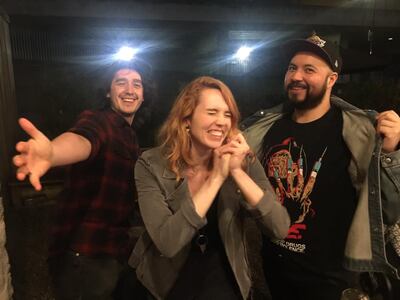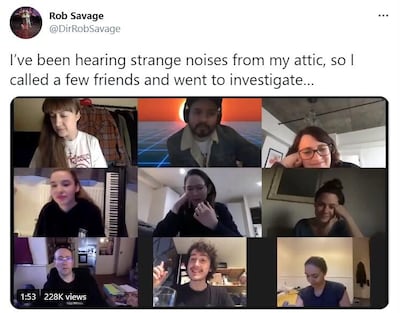Whoever said "nothing good happens after 2am" had clearly never come up with an idea for a surprise hit movie that started as an online prank among friends and blew up to become one of the most acclaimed horror films, not only of the year, but of the decade.
For the creators of Host, the British horror movie based around Zoom that recently arrived on OSN to scare the bejeezus out of the UAE, it was precisely during that time between 2am and dawn that something very good (and by very good, we mean terrifyingly scary) happened.
It started, as some of the most fantastical ideas usually do, with a 4.30am idea sent on WhatsApp from London writer and horror fan Jed Shepherd, to his equally sleep-deprived friend and director Rob Savage. A message that Shepherd then promptly forgot about as he finally drifted off to sleep in the early morning haze of creative insomnia.
By the time he woke up, his two-word idea – "Zoom seance" – was pitched by Savage to some of the biggest horror production studios in the world. US streaming service Shudder not only greenlit the project and put up the cash, but also said: "You've got two weeks to put a script together."
Shepherd and his co-writers, Savage and Gemma Hurley, got together – over Zoom calls, of course, because London was deep into a tier 3 lockdown then – to craft a nerve-twangingly terrifying jump-fest that, while owing plenty to 1999's genre-subverting The Blair Witch Project, also managed to perfectly capture the modern zeitgeist.
In this instance, the creeping sense of impending doom the pandemic had unleashed across the globe. Or, as the New York Times puts it, a horror that "speaks to our moment of uncertainty".
Shudder loved the script. "Now go away and make it," the company said. "You've got 12 weeks."
‘We were just making a film for our friends, with our friends’
"In early lockdown in the UK last year, I started a WhatsApp group that was a quarantine movie club, and invited all my filmmaker friends – actors, producers, stunt guys – so we could watch films on Netflix together," says Shepherd.
“When we ran out of films, Rob told me he wanted to prank our friends. So, he got us all on Zoom then said he’d heard a noise in his attic. He went up there and had something jump out on him, then he fell down the ladder and played dead.
"All the while our friends were freaking out, and I'm trying to keep a straight face. He put it up on Twitter and when the [social media entertainment] website Ladbible picked up on it, it got 17 million views in two days."
Naturally, content-hungry studios and streaming platforms all came a-knocking. However, Shepherd says: "Shudder was the only studio that could see the potential of making it in lockdown because everyone else wanted to wait until after."
The two-week deadline to come up with a script, then 12 weeks to make the film, resulted in a 56-minute-long fright-fest. Time magazine describes it as: "Not only one of the best horror movies of the year, but also an intimate look at creativity, film production and a shared global culture in the throes of a rampaging virus."
As Shepherd puts it: “While everyone else was making banana bread, we made a film.”
To get the cameras rolling, so to speak, the actors got sent an iPhone, which they taped to the back of their laptop so the phone camera captured the point of view of a Zoom call.
“Then everyone roped in their partners and parents to help with things like pulling strings to make things move around on-screen. The actors did their own hair and make-up and put blood all over themselves using YouTube instructionals,” Shepherd reveals.
“They’d make their own sounds and footage to be uploaded at the end of the day.
“It was an unusual process because we made it with our friends and were just making a film that would be fun for us.”
"Us" in this instance comprised the various members of the quarantine movie WhatsApp group, including actresses Haley Bishop, Jemma Moore, Emma Louise Webb, Radina Drandova and Caroline Ward, along with co-writers Hurley and Savage, who had created and directed the short Dawn of the Deaf with Shepherd before.
Rewriting Hollywood’s rules
There is no denying that Hollywood has been responsible for predominantly shaping the notion of what a film should be and how it should be made. What the industry has successfully done is convince the moviegoing public that scripts should spend years in development, shoots should take upward of nine months, or years even, and films should last for hours.
And all that's before the millions of dollars spent on special effects, while double the movie budget is often splurged on global marketing.
But in less than three months, Host managed to lay waste not only to its audience's ability to ever use Zoom again without nervously looking over their shoulder, but also to the traditional Hollywood way of doing things.

"One of the things we rewrote was the rule that hours and hours be spent watching a movie. We didn't want a three-hour-long film, so we had to be very lean, introduce the characters and have the audience empathise with them in order to have best impact," says Shepherd.
"We also didn't even have a trailer or poster when it dropped because we had no expectations," he says. The film was released by Shudder only two days after Savage delivered it.
"It was sent out to some press and horror websites, but there was no press release and zero engagement. We had some of the biggest horror genre websites in the world calling us the scariest film of the decade and the most important horror film since The Blair Witch Project, and we were like: 'Oh, we made this for us and our friends.'"
‘It was made during a rare time in history’
Enjoying a limited theatrical release in the UK, the global roll-out also took in Asia, South America and Europe, with the Host team pulling off what Forbes has called a "stunning feat", creating a film that maintains a 100 per cent score on film review aggregator website Rotten Tomatoes.
“There are a lot of things we’ve learnt that we can bring to our next project, which is that we don’t need a long time to write, and we don’t need to cast too far and wide as our friends can do a great job,” says Shepherd.
“By making it in lockdown, it was a rare time in history because everyone was available, no one had any other projects on. For the first time ever, we all had nothing to do.”
And what about a sequel? Because there are still some inevitable Hollywood rules that even horror auteurs can’t escape.
"Everybody whose seen Host wants a sequel," says Shepherd, "but it will be very hard to replicate, that's been the only downside."
"It was one of the first films about what is happening now, it was really zeitgeisty, so a high bar has been set. But, having said that," he adds, "I do have an idea for Host 2."
‘Host’ is available to watch in the UAE on OSN


